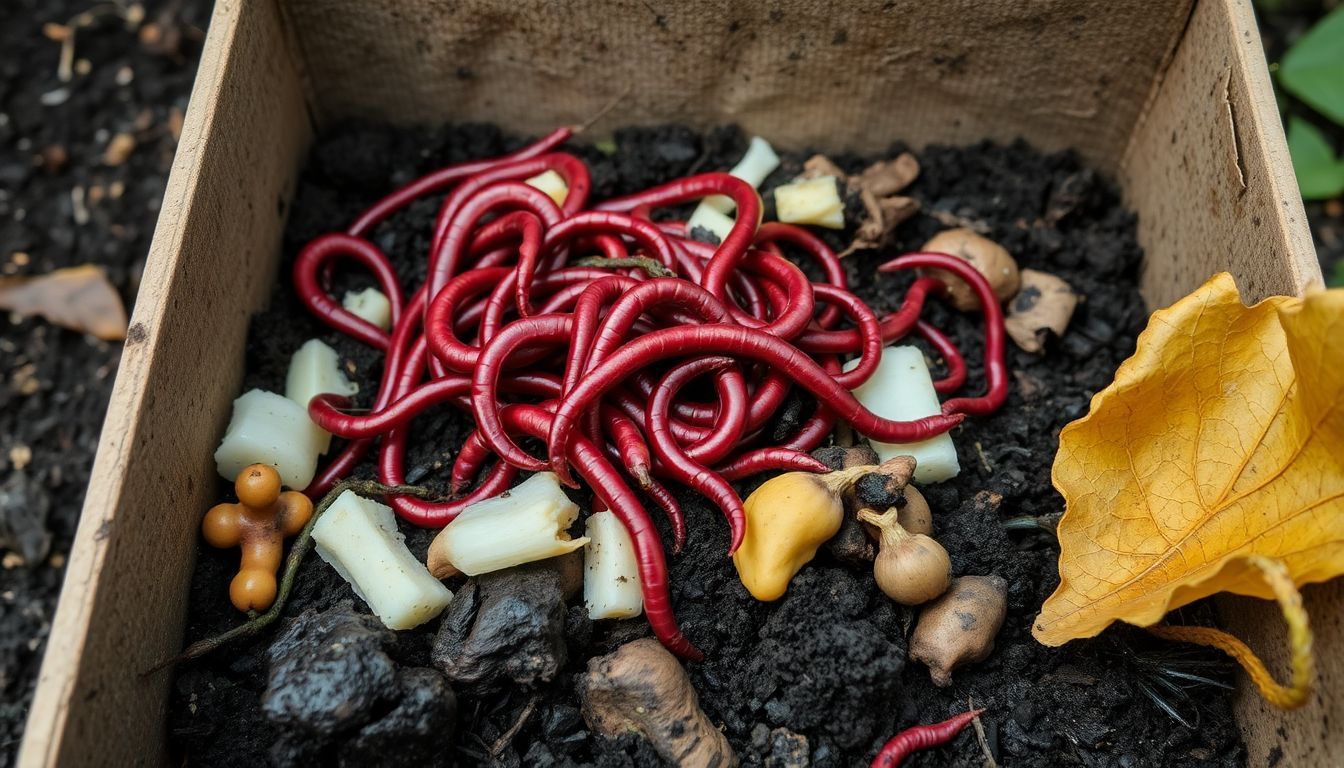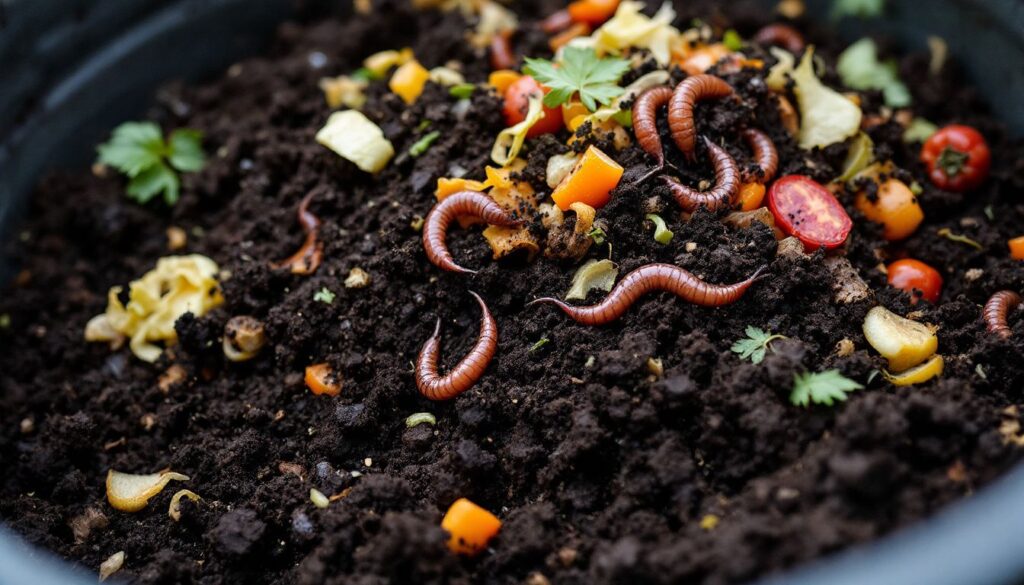Feeling fed up with tossing food scraps that pile up in landfills and hurt our planet? We’ve faced this waste problem too, and found that vermicomposting turns kitchen waste into rich soil with the help of worms.
Our guide shows how this simple process gives smashing benefits for your garden and the earth. These little wiggly recyclers are just waiting to lend a hand in your home. It’s quite brilliant how these hungry creatures can munch through your tea bags and veg peelings, turning what might have been rubbish into garden gold.
Why not give it a go?
Understanding Vermicomposting

Vermicomposting uses worms to break down organic waste faster than normal composting. We can create rich soil while cutting our carbon footprint with this simple method.
What is Vermicomposting?
Vermicomposting uses worms to turn food scraps and plant waste into rich soil. We call it “worm composting” because special worms like red wigglers eat organic waste and make worm castings.
These castings form a dark, nutrient-rich compost that helps plants grow strong.
Worm castings are nature’s perfect plant food – the result of over 9,000 earthworm species working as tiny recyclers.
The process differs from regular composting because it relies on epigeic earthworms to do the work. These surface-dwelling worms break down organic material faster than normal decay.
The final product contains helpful microbes, nutrients, and partly broken-down matter that makes soil healthier. Many gardeners value this soil amendment for its ability to boost plant growth naturally.
How It Differs from Traditional Composting
We find worm composting quite different from regular composting methods. Traditional composting relies on heat-loving bacteria that create high temperatures (50-65°C) to break down waste.
In contrast, vermicomposting works at cooler temperatures because excessive heat would kill the red worms. These special epigeic earthworms live in the top layer of organic matter, not soil.
They eat food scraps and shredded materials, turning waste into rich compost.
The end products differ in cost and use. Vermicompost sells for £150-£900 per cubic yard, while regular compost costs only £23-£27. Despite being more expensive, we need less vermicompost to achieve the same soil benefits.
The worms create nutrient-rich soil amendment that boosts microbial activity far better than traditional compost. This makes vermicompost a powerful tool for organic waste recycling and sustainable gardening practices.
Positive Impact on Waste Reduction
Vermicomposting cuts down household waste by up to 30%. This eco-friendly practice turns kitchen scraps into rich soil, keeping tonnes of waste out of landfills each year.
Recycling Organic Waste
We can transform a huge amount of waste through vermicomposting. In North Carolina, 60% of waste from communities and businesses is organic material that could be recycled rather than sent to landfills.
This fact led to Rhonda Sherman’s work at North Carolina State University, where she now directs the Compost Learning Lab. The lab shows how food scraps, yard trimmings, paper, manure, and farm waste become rich soil helpers through worm-based composting.
Organic waste isn’t trash – it’s a resource waiting to be recycled into something valuable for our soil and plants.
Our state took a big step in 1993 by making recycling a law. This move helped start many green efforts, including better ways to handle organic waste. The composting process uses worms to break down materials that would otherwise rot in landfills.
This simple method turns waste into a useful product for gardens and farms while cutting down on trash.
Reduction of Landfill Waste
Beyond recycling organic waste in our homes, vermicomposting plays a vital role in landfill waste reduction. Food waste makes up the largest part of what goes into landfills. This waste breaks down without oxygen and creates methane, a harmful greenhouse gas.
Our planet faces serious challenges from these emissions. Vermicomposting offers a direct solution by keeping organic matter out of dumps.
Landfill reduction through vermicomposting supports resource conservation and pollution control. Each bin of worms can process pounds of kitchen scraps weekly that would otherwise end up in the waste stream.
This simple action helps cut methane emissions at their source. The environmental impact extends far beyond our gardens as this practice tackles waste at a basic level. Many cities now promote vermicomposting as part of their waste diversion plans.
Benefits for Soil Health
Vermicompost adds vital nutrients to soil that plants need to grow strong. Worms break down organic matter into a form that improves soil structure and helps plants resist disease.
Enriching Soil with Microorganisms
We see earthworms as true “microbe factories” in our soil. These tiny workers create vermicast that boosts soil nutrition in amazing ways. The magic happens as worms digest organic matter and mix it with helpful microbes in their gut.
This process fills our soil with life-giving bacteria and fungi that plants love.
Our gardens thrive with these added microbes. Studies show vermicompost stops many plant diseases like pythium rot in cucumbers. The special phenolic compounds in vermicast keep pests such as aphids, caterpillars, and spider mites away from our plants.
Soil treated with vermicompost also has fewer harmful nematodes. The improved soil structure holds water better and allows roots to breathe more easily. Next, we’ll explore how these soil improvements lead to better water retention and aeration in your garden beds.
Improved Water Retention and Aeration
Vermicompost works wonders for soil structure. It creates tiny spaces that help water flow through soil while also holding moisture for plants to use. Our tests show that healthy soil needs 5% organic material, but many farms only have 1% due to over-farming.
The organic matter in vermicast acts like a sponge, soaking up water during rain and slowly releasing it to plant roots.
Good soil drainage stops roots from drowning, while proper aeration lets them breathe. Worm castings boost microbial diversity in the soil, which breaks down nutrients for plants to absorb.
This rich microbial activity explains why plants grown with vermicast show stronger root systems and better growth. Next, we’ll explore how these soil improvements directly impact plant health and yield.
Role in Sustainable Gardening Practices
Vermicomposting plays a key role in sustainable gardening by creating a natural cycle of nutrients. We use worm castings to boost plant growth without harmful chemicals, making our gardens truly eco-friendly.
Enhancing Plant Growth and Yield
We’ve seen amazing results when plants grow in soil mixed with vermicompost. Research shows turnips grown with 20% vermicast grew better than those with 0% or 10%. Plants didn’t gain extra benefits at 30% or 50% levels, showing there’s an ideal amount to use.
Vermicompost works differently from regular fertilisers by making soil healthier rather than just feeding plants directly. This natural approach supports plant nutrition through improved soil structure.
Our gardens, farms and vineyards all benefit from this organic method. Vermicompost adds vital microorganisms that help create a living soil web. These tiny helpers break down nutrients so plants can take them up more easily.
The rich biofertiliser improves water retention too, which means less watering for stronger plants. Crop yields increase as plants access more balanced nutrition through this sustainable practice.
Many farmers now use this method as part of their organic farming toolkit.
Promoting Organic Farming
Vermicomposting plays a vital role in organic farming by creating rich, natural fertiliser. Our gardens thrive with worm castings that boost plant growth without harmful chemicals.
Rhonda Sherman, a top expert from North Carolina State University, shows how vermiculture supports sustainable farming in her book *The Worm Farmers Handbook* (2018). Her work at the Compost Learning Lab proves that worms help create healthy soil for better crops.
Farmers who use vermicompost notice stronger plants and higher yields in their fields. This natural approach fits perfectly with organic agriculture goals by recycling kitchen scraps into valuable soil food.
The annual NC State Vermiculture Conference, running for 22 years with people from 122 countries, shows growing interest in this practice. Many gardeners learn these methods through resources like joegardenerTV tutorials and podcasts such as *The No-Till Market Garden*, making organic farming more accessible to everyone.
Conclusion
Worm-based composting gives us a simple way to help our planet. We can turn food scraps into rich soil that helps plants grow strong. This method cuts down on trash in landfills and lowers harmful gases in the air.
Our gardens thrive with less water and fewer pests when we use worm castings. By adding this green habit to our lives, we join a growing movement that puts Earth’s health first.




